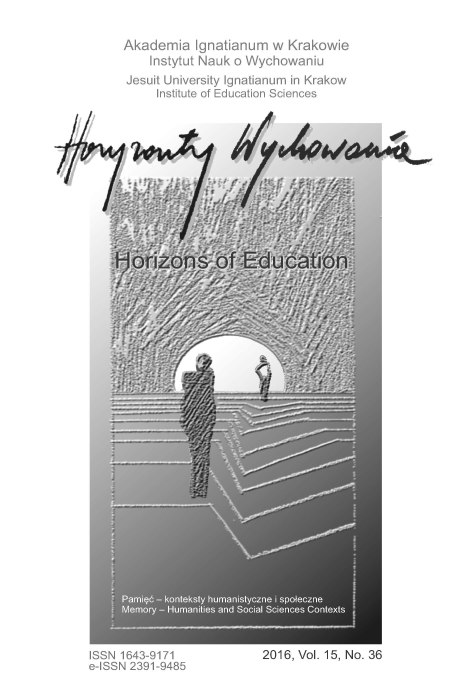Pamięć – „stare”, „nowe” i „najnowsze” konteksty językowo‑kulturowe
Memory – The „Old”, the „New” and the „Newest” Linguistic and Cultural Contexts
Author(s): Katarzyna SkowronekSubject(s): History, Social Sciences, Language and Literature Studies, Historical Linguistics
Published by: Uniwersytet Ignatianum w Krakowie
Keywords: pamięć; lingwistyka; Internet; technologia; potoczność
Summary/Abstract: CEL NAUKOWY: Artykuł mieści się w lingwistycznym nurcie badań nad pamięcią. Autorka bada leksykalno‑semantyczną kategorię pamięci we współczesnej polszczyźnie, jej redefinicje i rekontekstualizacje. PROBLEM I METODY BADAWCZE: Tekst jest kontynuacją i uzupełnieniem wcześniejszych analiz Anny Pajdzińskiej i Wojciecha Chlebdy. Na podstawie danych językowych pochodzących z wybranych słowników języka polskiego oraz badań tekstów internetowych autorka konstruuje model pamięci i wskazuje starsze, nowe i najnowsze konteksty leksykalne, w jakich to słowo się pojawia. Zauważa znaczne przeobrażenia w tym zakresie. Zmiany w funkcjonowaniu tego leksemu i jego semantyce są oznakami zmian we współczesnej kulturze.PROCES WYWODU: Autorka przypomina m.in. praindoeuropejską etymologię tego wyrazu, odnosząc ją nie tylko do ludzkiej dyspozycji mentalnej, ale i do aspektu (samo)świadomości. Ukazuje najważniejsze metafory pojęciowe (m.in. pamięć jako naczynie w umyśle), utrwalone w dawniejszych i współczesnych słownikach językach polskiego. Analizuje także obecne przemiany semantyczne i frazeologiczne dokonujące się w obrębie tego pojęcia, badając dwa typy tekstów internetowych: frazy w wyszukiwarce Google i elementy werbalne w ramach tzw. demotywatorów.WYNIKI ANALIZY NAUKOWEJ: Autorka wskazuje, że pamięć rozszerza obecnie swoje znaczenia, z jednej strony w stronę biologii/ psychologii i wysokiej technologii, z drugiej – w stronę potoczności, prywatności, dystansu i humoru. WNIOSKI, INNOWACJE, REKOMENDACJE: Badanie tekstów internetowych pokazuje znaczne przemiany w obrębie domeny pamięci. Tworzone są nowe quasi‑definicje i nowe profile znaczeniowe tego słowa, te mniej istotne jeszcze kilka lat temu – obecnie stają się centralne. Artykuł pokazuje, w jaki sposób analizy językoznawcze mogą prowadzić do refleksji kulturoznawczej.RESEARCH OBJECTIVE: The article discusses linguistic aspects of the study of memory. The author examines lexical and semantic category of “memory” in the contemporary Polish language , its redefinitions and recontextualisations. THE RESEARCH PROBLEM AND METHODS: The text is a continuation and an addition to earlier research conducted by Anna Pajdzińska and Wojciech Chlebda. Using linguistic data coming from selected dictionaries of the Polish language and Internet texts, the author constructs the model of memory and highlights the older, the newer and the newest lexical contexts in which the word appears. She indicates significant metamorphoses. The changes in functioning of the lexeme and its semantics are symptoms of development of the modern culture. THE PROCESS OF ARGUMENTATION: The author reminds us of the Proto‑Indo‑‑European etymology of the word and she relates it not only to human mental capacity but also to the aspect of (self)awareness. She presents the most important metaphors, e.g. memory as a container in mind, solidified in older and contemporary dictionaries of Polish. She also analyses the current semantic and phraseological changes taking place within the word, using the example of two Internet texts: Google search queries and the verbal elements of the so‑called demotivational posters. RESEARCH RESULTS: The author shows us that memory currently broadens its meaning. On the one hand it goes towards biology and psychology and on the other hand it towards colloquiality, privacy, distance and humour. CONCLUSIONS, INNOVATIONS AND RECOMMENDATIONS: Analysing Internet texts shows us considerable changes occurring within the domain of memory. New quasi‑‑definitions are being created and new semantic profiles of the word – a few years ago considered peripheral – become central. The article presents the way in which linguistic analysis can lead to a cultural one.
Journal: Horyzonty Wychowania
- Issue Year: 15/2016
- Issue No: 36
- Page Range: 47-65
- Page Count: 19
- Language: Polish

